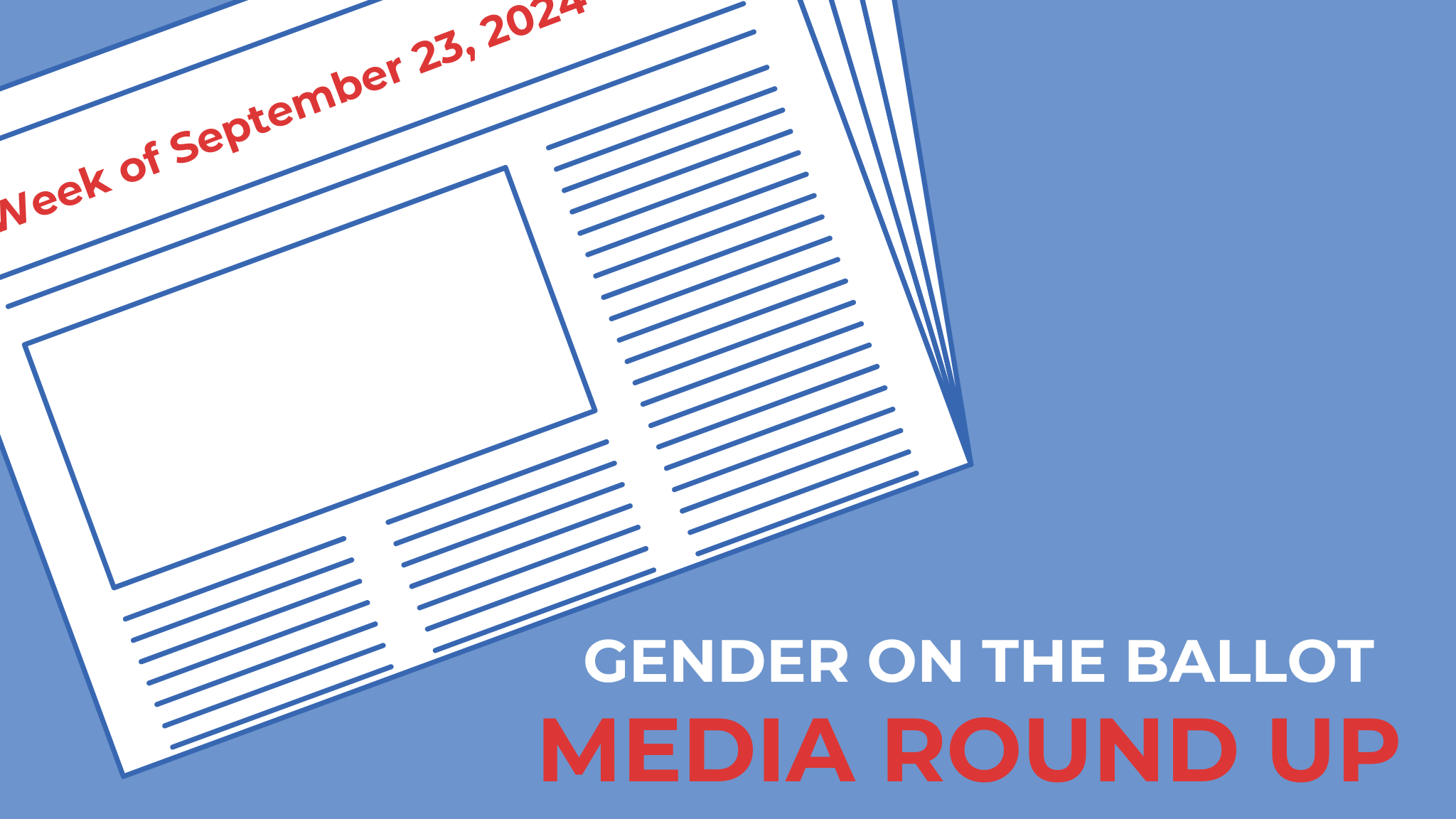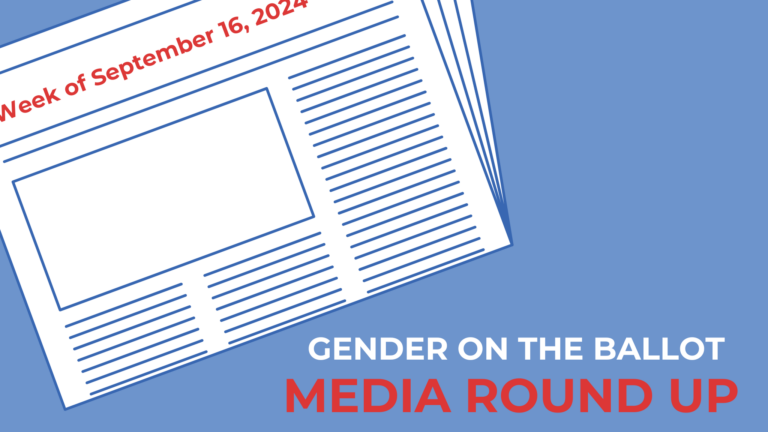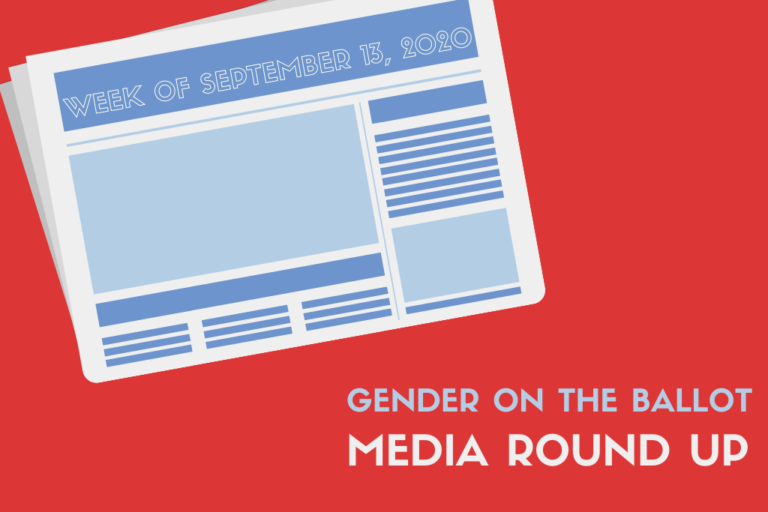Happy Friday! Welcome to our Media Round Up. Each week we’re collecting and sharing our…
Media Round Up: Week of September 23, 2024

Happy Friday! Welcome to our Media Round Up. Each week we’re collecting and sharing our favorite gender + politics stories.
The Politics of Motherhood Become a Campaign-Trail Cudgel
New York Times, Katie Rogers
The New York Times explores how the upcoming presidential election has exposed a fault line in the “motherhood divide” – the private and deeply personal decision to have children. Prominent conservatives have been trying to appeal to voters who may see an “existential value” in motherhood, attacking President Kamala Harris for not having biological children of her own. The latest jab came from Gov. Sarah Huckabee Sanders, who said at a campaign event for former President Donald Trump that, “my kids keep me humble. Unfortunately, Kamala Harris doesn’t have anything keeping her humble.” With an election that could be decided by women voters, “motherhood itself has become a campaign-trail cudgel.”
Kamala, but not Harris: Why people use female politicians’ first names
The Hill, Addy Bink
The Hill considers why people are more apt to use female politicians’ first names as compared to their male counterparts. While experts contend that referring to a female politician by first name only can “diminish their standing and widen the gender gap,” Vice President Kamala Harris’ campaign has actually encouraged the use of “Kamala,” putting her first name on campaign merchandise, signs, and social media. According to Ashley Etienne, a political advisor who served on President Joe Biden’s 2020 presidential campaign and as Harris’ communicators director, Democrats have tried to make candidates more relatable by using their first name. Since domestic policies such as parental leave and reproductive rights are at the forefront of this election season, referring to Harris as “Kamala” may also help encourage enthusiasm among Democratic voters, since women are “often viewed as having an advantage on these topics.”
Liz Cheney Suggests a New Political Party May Be Needed
The New York Times, Peter Baker
Former Wyoming Representative Liz Cheney is looking to move beyond former President Donald Trump is a major way: a new party entirely. Cheney, a lifelong Republican and daughter of former Vice President Dick Cheney, is just one of many breaking party lines for the 2024 Presidential election by voting for Vice President Harris. Cheney also revealed that she and Harris have spoken since the endorsement, and advised to “stay tuned.” She explains that the Republican party has lost its way and will struggle to regain trust and credibility among party elites and voters. A possible new party, one without House Speaker Mike Johnson, would focus on conservative ideals as Cheney hopes to return to politics and policy, not the sect of Republicans under Trump.
Elise Stefanik pushes to expand House GOP majority with record number of women
NBC News, Bridget Bowman
Just six years after a blue wave wiped out their ranks, Rep. Elise Stefanik is leading a charge to break the record for Republican women serving in Congress. The highest-ranking GOP woman in the House, Stefanik has worked to recruit and provide early support to prospective Republican women candidates since the 2018 midterms, when the number of Republican women in the House dwindled to 13. To break the current record, Republican women incumbents and challengers would need to win at least 11 of the 16 House races deemed competitive by the Cook Political Report with Amy Walter. “I still think we can get above where we are now,” Stefanik said.
Haley rakes Ohio Senate Candidate for criticizing suburban women on abortion stance
The Hill, Jared Gans
Former Republican presidential candidate Nikki Haley criticized GOP Ohio Senate nominee Bernie Moreno for recent comments he made regarding suburban women’s views on abortion. During a town hall on Friday, Moreno said that Democrats have many “single-issue voters,” especially suburban women whose top issue is abortion, which he deemed “a little crazy.” Haley slammed Moreno’s comments in a post on social media platform X, contending that his words could risk the election in an already tight race against incumbent Sen. Sherrod Brown. “Are you trying to lose the election?” she asked. “#Tonedeaf #DonLemonVibes,” Haley posted online, referring to comments former CNN anchor Don Lemon made last year stating Haley, 51 at the time, wasn’t “in her prime.”
The Struggle for the Young Vote: Division and Identity
With only 38 days until Election Day, Vice President Harris and former President Trump are both attempting to clinch the young vote. Harris does lead over Trump among young voters, but the gender divide is obvious, too. A new poll from the Harvard Institute of Politics shows that Harris leads with a 30 point margin among young women voters. Both candidates are also trying to secure the young Latina vote. Voting registrations among young Latinas has risen almost 150% since 2020, with both candidates using “freedom” as a key campaign strategy. Harris remarks on reproductive freedom, while Trump touts freedom from “socialist policies” on the left. One demographic has remained consistent, though: the LGBTQ+ vote. Vice President Harris leads with a 67 point margin among registered LGBTQ+ voters who intend to cast a ballot in November. Only 8% of respondents in that same poll plan to vote for former President Trump and JD Vance, while the Harris/Walz ticket topped at 77%. In an increasingly tense race, the young vote remains a source of contention and hope for both campaigns.






